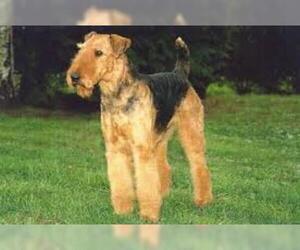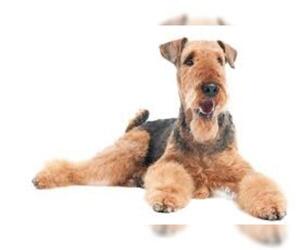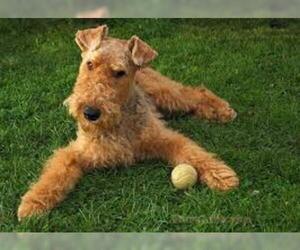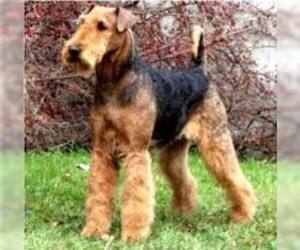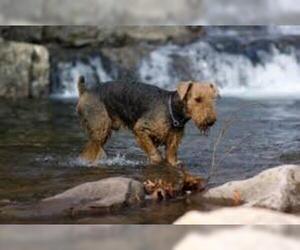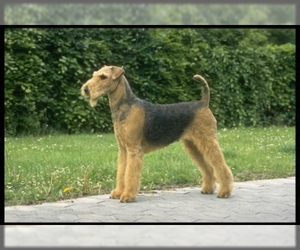
All about Airedale Terrier dog breed
A.K.A. :King of Terriers, Waterside Terrier, Bingley Terrier, Airedale, Aire, Airedale Hound, Working Airedale, Show Airedale
Size
Grooming requirements
Exercise requirements
Good with other dogs
Watchdog ability
Energetic
Training requirements
Playful
Affectionate
Good with other pets
Good with children
Good with strangers
Winter
Summer
Healthiness
Protective
Life Span
| Pure Breeds | Member |
| Breeds A - Z | A |
| Breeds by Group | Terrier |
| Breeds by Trait | High Stamina Dog Breeds Hypoallergenic Low Shedding Smartest Dog Breeds |
| Overview: | The Airedale Terrier, often called the "King of Terriers," is the largest of the terrier breeds, originating from the Aire Valley in Yorkshire, England. Bred initially to hunt otters and rats, they possess a distinctive dense, wiry coat, typically a tan and black saddle pattern, requiring regular grooming. Physically, they are strong and athletic, with a noble and alert expression. Temperamentally, Airedales are known for their intelligence, boundless energy, and spirited personality. While loyal and protective, their independent nature means they thrive with consistent training and early socialization. They are generally good with children and can be wonderful family companions for active households that can provide ample exercise and mental stimulation. Their energy levels make them less suitable for small apartment living unless daily, vigorous outdoor activity is guaranteed. Health-wise, they are a relatively robust breed, but like many larger breeds, can be prone to hip dysplasia, certain cancers, and skin allergies. Prospective owners should be prepared for their lively antics and strong will, but will be rewarded with an incredibly devoted and engaging companion. |
F.A.Q.
All You Need to Know About the Airedale Terrier Breed
The Airedale Terrier, often called the "King of Terriers," is a magnificent breed originating from Yorkshire, England. Known for their courageous and intelligent temperament, they possess a striking wire-haired coat, typically black and tan, with a distinctive beard. These energetic dogs are generally good with families, especially with proper socialization, making them excellent companions for active households. However, their size and exercise requirements mean they are not ideally suited for small apartment living without significant daily outdoor activity. The Airedale Terrier requires regular grooming to maintain its coat and moderate daily exercise to keep them mentally and physically stimulated. While generally a healthy breed, potential owners should be aware of common health considerations such as hip dysplasia and certain skin conditions. Their independent nature means consistent training is crucial for a well-behaved companion.Airedale Terrier Weight: Adult Airedale Terriers typically weigh between 40-65 pounds. Males are generally at the higher end of this range, averaging 50-65 pounds, while females usually weigh 40-55 pounds. This is the healthy weight for Airedale Terrier, reflecting their average size as a robust, medium-sized breed.
Curious about the Airedale Terrier height? These majestic "King of Terriers" are a substantial and impressive breed! When you're considering "how tall is an Airedale Terrier," it's good to know their typical adult dimensions.
The average size of an Airedale Terrier, measured at the shoulder (withers), typically falls within the range of 22 to 24 inches.- Most adult male Airedale Terriers tend to be on the taller end of this spectrum, often reaching about 23 to 24 inches.
- Female Airedale Terriers are generally slightly smaller, usually measuring around 22 to 23 inches.
The Airedale Terrier colors are primarily black and tan. This classic combination features a black saddle or "jacket" over the back, with tan markings on the head, ears, legs, and underparts. The tan can range from a light wheaten to a deep reddish-tan. This black and tan is the only AKC recognized Airedale Terrier color. While there are no other officially accepted colors, some rare Airedale Terrier coat types and exotic Airedale Terrier variations have been reported but are not recognized by major kennel clubs like the AKC and are not part of the breed standard. These might include variations in the tan shade, or very rarely, dogs with more extensive black or tan. However, colors such as blue, lilac, merle, chocolate, brindle, fawn, cream, or solid white are not typical Airedale Terrier colors and would indicate a mixed breed or a serious genetic anomaly not accepted in purebred Airedales. Potential adopters should be aware that claims of "rare" or "exotic" colors outside of black and tan for purebred Airedales are generally misleading.
The Airedale Terrier personality is characterized by a bold, intelligent, and independent nature. Known as the "King of Terriers," they are remarkably loyal and devoted to their families, often forming strong bonds. While generally friendly with their own people, their terrier instincts can make them a bit reserved or watchful with strangers, though not typically aggressive. Their temperament of Airedale Terrier is spirited and playful, making them good companions for active individuals or families. They are highly adaptable, and with sufficient exercise and mental stimulation, they can adjust to apartment living, though a yard is always preferred. They are generally good with children who understand how to interact respectfully with dogs, showing patience and an affinity for play. However, due to their strong prey drive, early and consistent socialization is crucial for harmonious relationships with other pets, especially smaller ones. Their independent streak means they benefit greatly from consistent training and a confident owner.
Airedale Terrier Temperament: The King of Terriers' PersonalityThe Airedale Terrier is a bold, intelligent, and spirited companion dog, renowned for its courage and lively disposition. Their loyal and affectionate nature makes them devoted family members.Friendliness & Sociability: Airedales are generally friendly with their own families and those they know. While not typically overtly social butterflies with strangers, they are rarely shy or fearful. Their inherent playfulness can make them engaging companions.Loyalty: Expect unwavering loyalty from an Airedale. They form strong bonds with their human family and are highly protective, often making excellent watchdogs due to their alertness and vocal nature.Adaptability to Apartment Living: While possessing a lot of energy, Airedales can adapt to apartment living if they receive sufficient daily exercise and mental stimulation. They are not couch potatoes and require regular walks, playtime, and engaging activities to prevent boredom and destructive behaviors. A yard is a bonus, but not strictly necessary if their exercise needs are met.Behavior with Children: When properly socialized and raised with children, Airedales can be wonderful playmates. Their sturdy build can withstand boisterous play, but supervision is always recommended, especially with very young children, as their terrier instincts can sometimes lead to roughhousing. They are not known for being overly delicate.Behavior with Other Pets: Due to their strong prey drive and terrier instincts, Airedales can be a challenge with other small pets like cats or smaller dogs if not introduced and socialized from a young age. They can coexist peacefully with other dogs of similar size, especially if raised together, but their assertive nature means they may try to be the "boss." Early and consistent training is crucial for multi-pet households.Stubbornness & Sensitivity: Airedales are intelligent but can be notoriously stubborn. They possess a strong will and an independent streak, requiring a confident, consistent, and patient owner. They respond best to positive reinforcement training and can be sensitive to harsh corrections. Their intelligence means they learn quickly, but their stubbornness can mean they choose when to obey. Owners should be prepared for a dog with a mind of its own.In summary, the Airedale Terrier temperament is a delightful blend of bravery, loyalty, and playfulness. They are an active, engaging, and loving companion dog for those prepared for their strong personality and commitment to their training and exercise needs.
Airedale Terrier Care: Essential Daily Maintenance & Health TipsAiredale Terrier care involves a commitment to their specific needs. They are a low-energy dog breed requiring minimal exercise, making them suitable for apartment living. Daily short walks and indoor play are usually sufficient.Grooming needs are moderate. Their short, wiry coat requires weekly brushing to remove loose hair and minimize shedding. Professional grooming or regular hand-stripping every 6-8 weeks is essential to maintain coat health and prevent matting. Regular nail trims are also necessary.Dietary considerations for how to care for an Airedale Terrier include a high-quality, balanced diet appropriate for their age and activity level. Avoid overfeeding to prevent obesity. Weight management is crucial for this breed.Due to their brachycephalic anatomy, wrinkle and ear cleaning are vital. Daily cleaning of facial folds with a damp cloth prevents skin infections. Ears should be checked weekly and cleaned as needed to prevent wax buildup and infections. They are sensitive to extreme temperatures, especially heat, so provide a cool environment in summer and monitor them during outdoor activities.Common health tips for Airedale Terriers include vigilance for skin issues like allergies and pyoderma, often presenting as redness or itching. Regular dental care, including brushing and professional cleanings, is paramount to prevent periodontal disease. Monitor their weight closely as they are prone to obesity, which can exacerbate other health issues. Regular veterinary check-ups are essential for preventative care.
The Airedale Terrier activity level is moderately high. These "King of Terriers" possess a good balance, capable of short, intense bursts of energy followed by periods of rest. They are suitable for active families who enjoy regular engagement.How active are Airedale Terriers? They require a minimum of 60 minutes of vigorous exercise needs daily, ideally split into two sessions. This could include brisk walks, jogging, playing fetch, or interactive games in a securely fenced yard. Their intelligent and energetic nature means they thrive on activities that stimulate both their bodies and minds. They enjoy playtime preferences like chasing balls, agility, and even participating in dog sports.While not extremely brachycephalic, Airedales do have a shorter snout than some breeds, making them susceptible to overheating in hot weather or during intense exercise. Owners should be mindful of their limitations due to their anatomy and avoid strenuous activity during the hottest parts of the day.Airedale Terrier exercise needs are not for low-energy households. They can become bored and destructive if their physical and mental stimulation requirements aren't met. Consistent training, socialization, and plenty of opportunities to burn off energy are key to a well-adjusted Airedale.
Airedale Terrier Health: What You Need to Know
The Airedale Terrier, while generally robust, does have some common Airedale Terrier medical issues potential owners should be aware of. Understanding these Airedale Terrier health problems is key to how to keep Airedale Terrier healthy.One significant concern, though less severe than in some other breeds, is their tendency towards a somewhat shortened snout, which can contribute to Brachycephalic Obstructive Airway Syndrome (BOAS). While not a "true" brachycephalic breed, their facial structure can still make them susceptible to labored breathing, especially during exercise or in hot weather. This leads to heat sensitivity, so always ensure they have cool, shaded areas and limit strenuous activity on warm days.Like many medium-to-large breeds, hip dysplasia is a concern, where the hip joint doesn't form correctly. Responsible breeders screen for this, but regular vet check-ups are important. Watch for limping or difficulty rising.Their dense, wiry coat, while beautiful, can lead to allergies and skin fold infections, particularly in areas like their muzzle or around their neck if not kept clean and dry. Regular grooming and promptly addressing any skin irritation are crucial.Less common but still noted are spinal problems, so observing their gait and activity levels is important.Brachycephalic dog care tips for Airedales include managing weight, using a harness instead of a collar to avoid pressure on the windpipe, and avoiding extreme heat or overexertion. Overall, providing a balanced diet, regular exercise, and consistent veterinary care are the best ways to manage these potential issues and ensure a long, healthy life for your Airedale.Breed Breakdown: What Experts Say About the Airedale Terrier
I would rate the Airedale Terrier's "Size" trait as a 7.Airedale Terriers are considered a medium-to-large breed. They typically stand around 23 inches at the shoulder and weigh between 50 to 70 pounds, with some individuals being larger. Their body structure is sturdy, athletic, and muscular, giving them a significant physical presence. Compared to very small companion dogs like Chihuahuas (1-2 lbs) or medium breeds like Beagles (20-30 lbs), the Airedale is substantially larger. While not as massive as a Great Dane (150+ lbs) or a Mastiff (200+ lbs), they are certainly not a small dog.Their size means they aren't ideally suited for very small apartment living without significant daily outdoor exercise, as they need space to move around comfortably. While they can travel, their size can make air travel in-cabin impossible and requires a larger vehicle for road trips. Households with space constraints might find an Airedale a bit much unless they are committed to providing ample outdoor time and dedicated play areas. They are more comfortable in homes with a yard or regular access to open spaces.
I would rate the Airedale Terrier's grooming requirements as a 7.Airedales have a dense, wiry double coat that, while not a heavy shedder, requires regular attention to prevent matting and maintain its texture. To achieve the classic Airedale look and keep the coat healthy, hand-stripping is typically recommended every few months. This process, which involves plucking dead hairs, can be time-consuming and may require the services of a professional groomer, making it more specialized than simply brushing. If hand-stripping isn't an option, regular clipping can be done, but it will soften the coat texture. Beyond the coat, their ears need regular cleaning to prevent infections, and nail trimming should be done frequently as with most active breeds. While they aren't particularly prone to excessive skin folds or highly sensitive skin, routine bathing every few weeks or as needed will keep them clean. Compared to breeds with very short, low-maintenance coats or those that rarely require professional intervention, the Airedale's coat demands a more dedicated and often specialized grooming regimen.
I'd rate the Airedale Terrier's exercise requirements at a 7.Airedales are not couch potatoes, nor are they extreme athletes with unending stamina like some working breeds. They possess a robust energy level and a keen intelligence that, if not channeled through physical activity and mental stimulation, can lead to destructive behaviors and an unhappy dog. They thrive on structured routines that include a good deal of movement. Daily long walks or jogs are a minimum, and they truly shine when given opportunities for more vigorous exercise like off-leash running in a secure area, hiking, or participating in dog sports such as agility, obedience, or tracking. While they don't have the severe respiratory limitations of extremely brachycephalic breeds, their terrier nature means they are built for action and require sustained movement to be truly content. They aren't satisfied with a quick potter around the block; they need purposeful activity to burn off energy and satisfy their natural drive.
I would rate the Airedale Terrier's "Watchdog Ability" as an 8 out of 10.Airedales are highly intelligent and alert dogs with a strong sense of their territory and their family. They are not typically a "passive companion" in a watchdog sense. Their excellent hearing and keen observational skills mean they are quick to pick up on unfamiliar sounds or the presence of strangers. When they detect something unusual, their barking is usually robust and authoritative, serving as a clear early warning system. While not inherently aggressive, their size, powerful build, and confident demeanor are often enough to deter potential intruders. They possess the willingness to protect their home and family, making them capable of providing meaningful early warnings and a significant deterrent in a home environment.
I would rate the "Good with Other Dogs" trait of the Airedale Terrier at a 4.Airedale Terriers are known for their strong prey drive and independent nature, which can translate into a cautious or even dominant approach to other canines. While they can certainly coexist peacefully and even form strong bonds with other dogs, especially when raised with them from a young age, they are generally not a breed that intrinsically thrives in large, boisterous canine company without significant socialization and ongoing management. They often require careful introductions and supervision, particularly with unfamiliar dogs or those perceived as challenging their status. Their terrier tenacity means they are unlikely to back down from a confrontation, and their size and strength can make such encounters serious. While aggression isn't their primary mode, a lack of appropriate early socialization and continued positive exposure can lead to reactivity or territorial behaviors towards other dogs. They can adapt to multi-dog households, but it often requires a strong, consistent owner who understands dog behavior and is committed to managing interactions. They are not typically a "go-with-the-flow" breed when it comes to other dogs; peaceful coexistence is usually a result of deliberate effort and training rather than an inherent, highly sociable disposition.
I would rate the Airedale Terrier's "Energetic" trait as an 8 out of 10.Airedales are naturally very active and possess significant endurance. They were historically bred for hunting and require substantial physical and mental stimulation to be well-adjusted companions. They are highly playful and thrive on opportunities to participate in outdoor and athletic activities such as hiking, jogging, and even dog sports like agility. They are definitely not laid-back compared to many other companion breeds and will become bored and potentially destructive if their exercise needs are not met. They have a strong drive to move and explore.It's important to note that the Airedale Terrier is *not* a brachycephalic breed. They have a more traditional, longer muzzle, which significantly contributes to their good stamina and exercise tolerance, allowing them to engage in vigorous activity without the respiratory difficulties often seen in brachycephalic dogs. This anatomical advantage allows them to maintain their high energy levels during prolonged physical exertion.
I would rate the Airedale Terrier's "Training Requirements" a 7 out of 10.While intelligent and capable of learning a great deal, the Airedale Terrier is not a "plug and play" dog when it comes to training. Their intelligence is often paired with a strong independent streak and a "what's in it for me?" attitude, which can be interpreted as stubbornness. They have a decent attention span when engaged, but can quickly become bored with repetitive drills, requiring trainers to be creative and keep sessions interesting. Responsiveness to commands can vary greatly depending on the dog's mood, the perceived reward, and the strength of the bond with the trainer. Consistency is absolutely paramount; any lapse in rules or expectations will be quickly exploited. Positive reinforcement, especially involving food and engaging play, is highly effective, but harsh methods will quickly shut down an Airedale and damage the relationship. They are generally *not* beginner-friendly and truly thrive with experienced handling that understands their unique blend of intelligence and willfulness, combined with a commitment to structured routines and ongoing mental stimulation throughout their lives.
I would rate the Airedale Terrier's "Playful" trait a 9 out of 10.Airedales are incredibly spirited and possess a zest for life that is evident in their daily interactions. They have a naturally high activity level and thrive on engagement, showing a profound love for games, especially those involving retrieving or a good chase. Their attention-seeking behavior during playtime is often charmingly persistent, and they respond to toys and interactive games with an almost boisterous enthusiasm. While intelligent and capable of relaxing, they are far from laid-back compared to many other companion dogs, constantly ready for an adventure or a vigorous romp. Their inherent terrier nature means they are always up for some fun, making them extremely energetic and fun-loving companions.
I would rate the Airedale Terrier's "Affectionate" trait at a 7.Airedales are certainly loyal and devoted to their families, enjoying their human companionship and often following them from room to room. They form strong bonds and are quite sensitive to their owners' moods, often offering a comforting presence. However, their independent and sometimes "regal" nature means they aren't typically the most outwardly demonstrative or "velcro" dogs. While they appreciate a good cuddle or a scratch behind the ears, they aren't usually known for being constant lap dogs or demanding constant physical closeness. They are more likely to lie near you than directly on you, and while they thrive on being part of the family unit, they also possess a certain self-sufficiency. They offer a deep, steady affection rather than an overwhelming, effusive one, making them more independent than some other companion breeds, but far from emotionally distant.
I would rate the Airedale Terrier's "Good with Other Pets" trait as a 4.Airedale Terriers generally possess a strong prey drive due to their badger-hunting origins, which can make them challenging to integrate into households with smaller pets like cats, rabbits, or even very small dogs. While they can coexist with other dogs, especially those of a similar size and energy level, early and consistent socialization is absolutely crucial. They are not naturally inclined to be extremely pet-friendly and often require significant training and supervision to ensure peaceful cohabitation. Resource guarding, particularly of food or favored toys, can also be a concern. While some individuals can be raised to tolerate other pets, it's typically a result of dedicated effort and management rather than an innate breed characteristic. They are more likely to require training and supervision to coexist peacefully rather than being naturally sociable with all other animals.
I'd rate the Airedale Terrier's "Good with Children" trait a 6 out of 10.Airedales are generally good with children, but they aren't instinctively gentle giants. Their terrier heritage gives them a playful, energetic, and sometimes boisterous nature. They adore being part of family activities and can be fantastic playmates for older, more respectful children who understand how to interact with a strong, energetic dog. They have a good tolerance for noise and activity, fitting well into a busy household. However, their size and exuberance mean they can inadvertently knock over smaller children during play. While they are intelligent and trainable, consistent training and early socialization are crucial to ensure they learn appropriate boundaries and gentleness, especially around very young children. They aren't prone to aggression but require supervision to prevent over-excitement and to teach both the dog and the child how to interact safely. They thrive in a family that can provide clear guidance and exercise, allowing their affectionate and loyal nature to shine.
I would rate the Airedale Terrier's "Good with Strangers" trait a 6 out of 10.While not inherently unfriendly, Airedales are generally more reserved and discerning than some other breeds when it comes to unfamiliar adults. They tend to be confident and observant, often preferring to assess a new person before offering their affection. They aren't typically the type to immediately bound up to a stranger for attention; instead, they might maintain a watchful distance or offer a polite but brief acknowledgment. Their historical role as a protector can manifest as a moderate guarding instinct, meaning they might bark to alert you to an unfamiliar presence. However, they are highly intelligent and adaptable, and with consistent and early socialization, they can become quite comfortable and even friendly in public or guest-filled environments. Without proper socialization, they can be more aloof or wary. They are not naturally outgoing with everyone, but rather they require training and positive experiences to cultivate a welcoming demeanor towards strangers.
I would rate the Airedale Terrier's "Winter" tolerance at a 7 out of 10.Airedales possess a dense, wiry, and somewhat coarse double coat, with a softer undercoat, which provides decent insulation. Their medium-to-large size and lean but muscular build also contribute to a reasonable ability to generate and retain body heat. They are not brachycephalic, meaning their respiratory system is well-suited for normal breathing in various temperatures. This, combined with their active nature, allows them to typically enjoy outdoor activities in cold climates without immediate risk.However, while their coat offers good protection, it's not as thick or long as breeds specifically bred for Arctic conditions, nor do they typically carry significant body fat reserves like some northern breeds. They are not immune to hypothermia in extreme cold, especially if inactive, wet, or exposed for prolonged periods. Therefore, while they are considerably more tolerant than breeds with thin coats or very small sizes, they are not as resilient as a Siberian Husky or a Newfoundland. Compared to many other companion dogs, they don't necessarily require "special" care in typical winter conditions, but owners in very cold or harsh climates should still be mindful of their exposure time, especially during periods of inactivity or severe weather. They will appreciate a warm place to rest after outdoor activities, and protective gear like coats might be beneficial for older or less active individuals, or during prolonged exposure in sub-freezing temperatures.
I would rate the Airedale Terrier's "Summer" tolerance at a 6.Airedales are not considered a brachycephalic breed, which is a significant advantage in heat tolerance compared to flat-faced dogs. They have a moderately long muzzle that allows for more efficient panting to cool themselves. However, their dense, double coat, while providing some insulation against both heat and cold, can become a disadvantage in extreme temperatures if not properly managed. This coat can trap heat close to the body, making them susceptible to overheating.While generally energetic and enjoying outdoor activity, Airedales do require careful monitoring during hot weather. Prolonged exposure to high temperatures or strenuous exercise in the heat can quickly lead to overheating and a risk of heatstroke. Their ability to regulate body temperature is better than brachycephalic breeds, but still less efficient than breeds with thinner coats or single layers. They will readily exert themselves if allowed, making owner vigilance crucial.Compared to many other companion dogs, especially those with short single coats or very sparse fur, Airedales do require special care in summer months. This includes ensuring constant access to fresh, cool water, providing shade, avoiding walks during the hottest parts of the day, and being mindful of asphalt temperatures. While they may not necessarily require constant climate control indoors like a Pug or Bulldog, an air-conditioned environment or a cool, tiled floor is highly recommended during heatwaves to prevent discomfort and potential heat-related illness. Regular grooming to remove dead undercoat can also help improve their heat tolerance.
I would rate the Airedale Terrier's "Healthiness" trait at a 7 out of 10.Airedales are generally considered a robust breed compared to many other companion dogs. They are known for their hardiness and often live full, active lives with a typical lifespan of 10-12 years, and sometimes longer. They don't commonly suffer from the severe brachycephalic breathing difficulties or widespread joint problems seen in some other large breeds. However, they are not without their specific health considerations. They can be prone to hip dysplasia and elbow dysplasia, particularly if not from responsibly bred lines with appropriate health clearances. Skin conditions, like hot spots or allergies, can also occur. Bloat (gastric torsion) is a serious concern for many deep-chested breeds, including the Airedale, requiring owners to be vigilant about feeding practices. Responsible breeding plays a significant role in minimizing these genetic predispositions. While not "high-maintenance" in terms of constant health crises, their size and activity level do necessitate regular exercise and a good diet to maintain their overall well-being, and owners should be aware of the potential for bloat and skin issues. Overall, with good care and responsible breeding, they are a fairly healthy and resilient breed.
I would rate the Airedale Terrier's "Protective" trait at an 8 out of 10.Airedales are highly alert and possess a strong sense of their territory and their family. They are known for their unwavering loyalty to their owners, which fuels their protective instincts. When it comes to strangers, an Airedale will typically be reserved and observant, not necessarily aggressive but certainly watchful. Their natural suspicion, combined with their imposing size and deep bark, makes them excellent deterrents and very effective watchdogs, immediately alerting their household to any perceived threat.While they are undoubtedly companion dogs, thriving on human interaction and being part of the family, their historical role as a versatile working dog, including a military dog, means they are perfectly capable of offering meaningful protection in a household setting. They will not hesitate to defend their family if they feel they are in danger, demonstrating courage and a willingness to stand their ground. They possess the intelligence and physical capability to act on their protective instincts, moving beyond just an alert to a more active defense if the situation demands it.
I would rate the "Life Span" trait of the Airedale Terrier at a 7.Airedale Terriers generally live for 10 to 12 years, which is a good average for a dog of their size, positioning them as an average to slightly above-average long-lived breed compared to many other companion dogs. While not reaching the exceptional longevity of some smaller breeds, they typically outlive many larger and giant breeds. They are not considered short-lived. Responsible breeding practices help mitigate genetic predispositions to conditions like hip dysplasia and certain cancers, which, if present, can unfortunately shorten lifespan. However, with good care, a healthy diet, and regular veterinary check-ups, many Airedales enjoy their full expected lifespan, often into their senior years.
Airedale Terrier Puppies for saleSee all puppies for sale
Airedale Terrier Dogs for adoptionSee all dogs for adoption
Airedale Terrier BreedersSee all breeders
Similar Dog Breeds for Airedale Terrier
Breed Mixes of Airedale Terrier
Quick Breed Selector 0 - not important, 1 - smallest, 10 - largest
Variants & Mistakes :Aerodale Terrier, Air Dale Terrier, Air-Dale Terrier, Airdale, Airdale Terier, Airdale Terrer, Airdale Terrier, Airdaleterrier, Airedal, Airedale Tereir, Airedale Tereier, Airedale Terier, Airedale Terrior, Airedale Terrer, Airedale Terrie, Airedale Terriar, Airedale Terries, Airedale Terreir, Airedale Terriera, Airedale Terrire, Airedale Terriro, Airedale Terry, Airedaleterrier, Airedall Terrier, Airedel Terrier, Airedell Terrier, Airedael Terrier, Airedate Terrier, Airedoale Terrier, Airedole Terrier, Airiedale Terrier, Airodale Terrier, Arydale Terrier, Eiredale Terrier, Eyredale Terrier, Iredale Terrier, Oiredale Terrier, Tiredale Terrier, Wairedale Terrier
